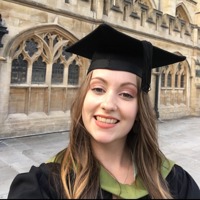
Abigail Smith
Trainee Medical Physicist at NHS
It's okay to have no idea what you want to do as a career - just try something and see if you like it! Change is always possible.
About Abigail...
Who am I?
"I find it difficult to describe who I am and which 'personality type' I have. So, I was excited to see my results from the personality test! I don't think I am a bossy person, but I wasn't surprised to get the Manager personality in my results. I was the SU president at my Sixth Form and the Chair of the Physics society at University. I enjoy planning and organising things, and working with people to get things done! So, 'manager' does suit me well. Perhaps if I progress in my career in the future towards a managerial role, I will see that these skills are helpful!The Quality Controller personality type wasn't a surprise either - I do like to make sure things are done well! I tend to notice the detail in a lot of things, which can mean I spend more time that I should on some tasks. This personality type also includes 'good at managing risk', which is very important in my role. I work with radiation, so I have to be sure I am minimising the risk from this every day!Finally, I did not expect to get the Trainer personality as a result - but, I am happy I did. I think it is important to share knowledge and understand when colleagues might need help. Also, I enjoy the challenge trying to explain things from my work in a way that is understandable to my family and friends (who aren't physicists). Everyone's brain works differently so it is important to adapt how you communicate in different situations. I have just volunteered as a STEM ambassador, so adjusting how I explain things will be so important if I want to encourage different types of people to enjoy science!"
What do I do?
"I am training to be a Medical Physicist in the NHS. Medical physicists work mostly 'behind the scenes' - we don't spend a lot of time with patients. But, we are vital to the diagnosis and treatment of Cancer. I will soon start to specialise in Radiotherapy Physics. Radiotherapy is the treatment of cancer with a beam of radiation. For this treatment to be given to patients, the physicists have to make sure the treatment machines are working properly and safely. It is our job to test different parts of the machines to make sure they are working. The physicist is also involved in planning the treatment. After a patient has a CT scan, the Doctor will outline on the image where they would like the patient to be treated with radiation. Then, the physicist can use this to plan how the machine will move around the patient to make sure all of the treatment is given to the area of cancer, and that no organs near to the cancer are damaged. It is then up to radiographers to drive the machine to deliver the treatment. So, although we might not be seen, we are an important part in a patient's journey. "
How did I get here?
"I studied physics at University of Bath and I did a placement year in between year 2 and 3. This means I spent time working in an industry for a year (and luckily I got paid). I worked for an energy company doing environmental monitoring - basically checking that no power plants were dumping more bad stuff out than they should have been! To be honest, my placement year was a little dull and I decided that I didn't want to go into that industry after graduating.This left me a bit stuck because I had no idea what I wanted to do as a career. A lot of people feel like this at some point and it can be scary, you just have to try some different things. In my final year, we had optional modules to choose. This is when I chose to study Medical Physics. The lectures were taught by staff from the hospital in Bath, which meant I could ask questions about the Medical Physics career. One lecturer in particular was very enthusiastic and motivating! He told us all about the STP (Scientist Training Program) ran by the NHS. This is a 3 year training scheme that starts after you graduate. There are many different areas of science you can apply to do the STP in - my area is Medical Physics. The application process was long and difficult, but with help from the careers service (very kind helpful people that you should always ask for help from!), I succeeded in the application and interview and got my first choice of training location! I have now completed a year of training and I am looking forward to learning more! If you like to continually learn, a graduate scheme like this is definitely a good choice for you. "
The life I live
"I think scientists can sometimes be mistaken as purely logical thinkers with no creative side! But, I think this is rubbish. I have loved music theatre ever since I was little, and even performed on the West End with my school. I love baking (not up to Paul Hollywood's standard but I make good vegan muffins) and have just dug out my old sewing machine to try and DIY some clothes. I am so grateful to live in the South West surrounded by beaches, woodland, and the moors. A windy coastal walk with my dog is the best way to spend a Sunday afternoon! A lot of people that live near the beach love to surf, but I never learnt - maybe next summer!"
My typical day
"A typical day at work is usually a mix of things. Every Monday morning there is a team catch up to discuss ongoing work and how things are going. Then I would check my emails for anything important. I usually spend time writing reports on things I have been learning/training in to submit to my Training e-Portfolio (this will show I am competent in various tasks at the end of my training). If I have finished a report, I submit it online and will receive feedback. So, some time is spent reviewing the feedback and making any changes. Also, if I have an assignment due for the University part of my training, I will do some work on that. At least once a week, I will observe a process such as a CT scan, Brachytherapy treatment, mask fitting in the mould room (required for head and neck treatment). Also, I find time to talk to someone in the department about what they are working on and go through things with them. This can include: Discussing a treatment plan someone has put together for a cancer patient who will receive radiotherapy. This is done by outlining the treatment area and various organs on a CT scan, then planning how the external radiation beams will move around the patient to give the dose needed. Understanding how the results of the quality control checks completed on the treatment machines are reviewed to check they are working as they should be.Training in how the 'run-up' of the treatment machines is done. This is the process completed in the morning to turn on the machines and check they are ready and safe to be used.These are all things I would be expected to do when qualified and that I will be trained in over the next 2 years. Most days, in the afternoon, I help with the quality control checks of the treatment machines. Different tests are done to check that various parts of the machine are working correctly and safely. This makes sure that patients are safe when they get treatment. The actual treatment is delivered by radiographers - the physicist role is more 'behind the scenes'!"
My qualifications
"I have 3 A-levels (Maths, Physics, Chemistry) from Sixth-form (same state school as my Secondary school).I also completed the AQA Extended Project (helpful for Uni applications!).Then, I went to the University of Bath and got a BSc in Physics.I am now studying part-time at the University of Liverpool for an MSc in Medical Physics (as part of my training)."



